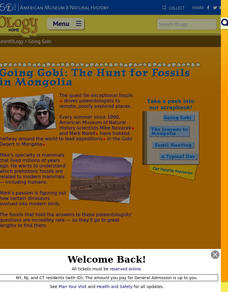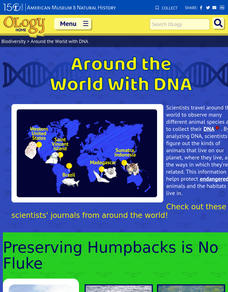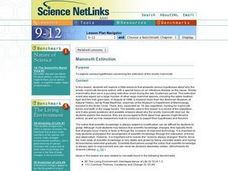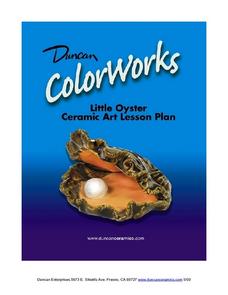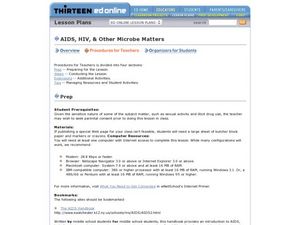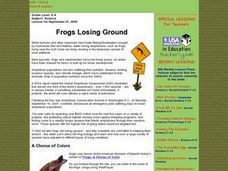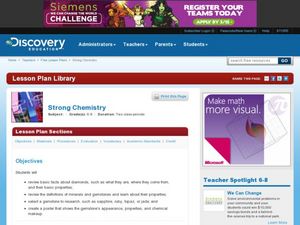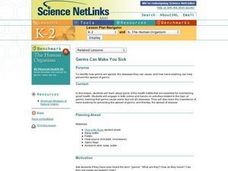American Museum of Natural History
Extreme Mammals
Extreme characteristics can create some unusual mammals. Learners flip through a slide show of some of the most interesting mammals that are both living and extinct. Implement as a remote learning resource or use in-class to review...
American Museum of Natural History
Going Gobi: The Hunt for Fossils in Mongolia
Take a trip on a fossil hunt. Pupils read about a trip to the Gobi Desert by a group of paleontologists to find fossils. Learners view pictures taken on the trip and determine what the scientists go through in the search for answers to...
American Museum of Natural History
Around with World with DNA
A mammalogist, ornithologist, ichthyologist, and a conservation geneticist share their work and their hopes that their research will help protect and save endangered species and their habitats.
American Museum of Natural History
What's This?: Mythic Creatures
Fantastic beasts, and where to find them, are featured in a resource that offers images of real animals that just might have given rise to some of mythic creatures of legend.
American Museum of Natural History
Journey to the Stars
Fifteen detailed pictures and informative captions delve deep into the exploration of stars—their life cycle and importance in the universe.
Curated OER
Mammoth Extinction
Students explore various hypotheses concerning the extinction of the woolly mammoth.
Curated OER
Butterfly 1: Observing the Life Cycle of a Butterfly
Pupils observe and identify the characteristics of the life cycle of a butterfly.
Curated OER
Little Oyster: Ceramic Lesson
Children will love researching and then creating a bottom dwelling mollusk of their own. They watch clips describing the ocean ecosystem and how oysters fit into their environment. Next, they research what oysters eat and how they look....
Curated OER
AIDS, HIV and other Microbe Matters
This series of lessons contains sensitive material. Please review to ensure that the content is suitable for your class. It begins by discussing what microbes are. Scholars are then asked to review a few online resources and answer...
Curated OER
Inspiring Freedom: The Remond Family and Abolitionism in Salem
Students examine the abolitionist movement in Salem. Exploring the contributions of the Remond family, they identify how they made the issue one of national and international importance. They discuss the views of the south and how...
Curated OER
Timely Tolerance
Eighth graders work together to focus on an oppressed group of society. Using the information they gather, they create a museum exhibit to educate their community on the group. They present their PowerPoint presentation to the class to...
Curated OER
Dinosaurs are for the Birds
Students use the Internet to see photographs of fossils from dinosaurs. They read articles about dinosaurs and birds and what they had in common. They also examine a dinorama site in which they discover why some dinosaurs needed feathers.
Curated OER
What Teeth Tell Us
Learners view pictures of a variety of animals. They examine the animals' teeth and discuss the differences in them. They experiment with staple removers (carnivore teeth) and two flat rocks (herbivore teeth) and determine which are most...
Curated OER
Frogs Losing Ground
Students explore an exhibit through an interactive program on frogs. They can listen to the different sounds frogs make and the different types of frogs. They search for the types of frogs they find in their local area.
Curated OER
The Facts of Life
Students explore the different ways scientists gather information about extinct animals. They utilize these methods to create illustrated story books about a particular extinct animal.
Curated OER
Alaska's Native Population: Eskimos, Indians and Aleuts
Students explore the unique population of Alaska. In this Native people of Alaska lesson, students discover the three groups of people who live in Alaska. Students describe the similiarities and differences between the three groups....
Curated OER
The Codex Comes Home: Leonardo Lives in Seattle
Students complete a unit on the life of Leonardo da Vinci and the content of the Codex Leicester. They write an encyclopedia entry, watch a film, complete a data sheet, conduct Internet research, and write a letter to Bill Gates about...
Curated OER
Mammoth Extinction
Students explore various hypotheses concerning the extinction of the woolly mammoth.
Curated OER
Strong Chemistry
Students research and create a poster about a gemstone. In this mineral properties lesson, students view a video about diamonds. They discuss the properties of minerals and choose a gemstone to research and create a poster.
Curated OER
In Search of the Amber Room
Students watch the film, "In Search of the Amber Room." In teams, they examine World War II and research to find the Amber Room. They present their case in written form, or as a Web site, or using video "clips" from the film
Curated OER
Physical Health
Students discover and identify how germs are spread, the diseases they can cause, and how hand washing can help prevent the spread of germs. They learn about some of the health habits that are essential for maintaining good health.
Curated OER
Water: H2O = Life
In this earth science worksheet, learners explore and describe animals and their adaptations, including their habitats, physical characteristics, and competing organisms. They also explore and describe how others use water around the...
Curated OER
What Can I Do?
Students identify feelings and learn how to handle conflict. In this character education lesson, discuss what to do when a friend is feeling sad and develop positive ways to handle negative feelings.
Curated OER
Germs Can Make You Sick
Students explore how germs are spread. In this science lesson, students practice good hand washing practices and discuss how washing hands can prevent the spread of germs.



